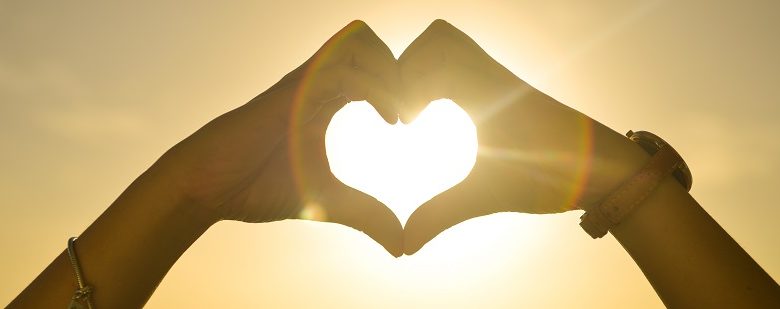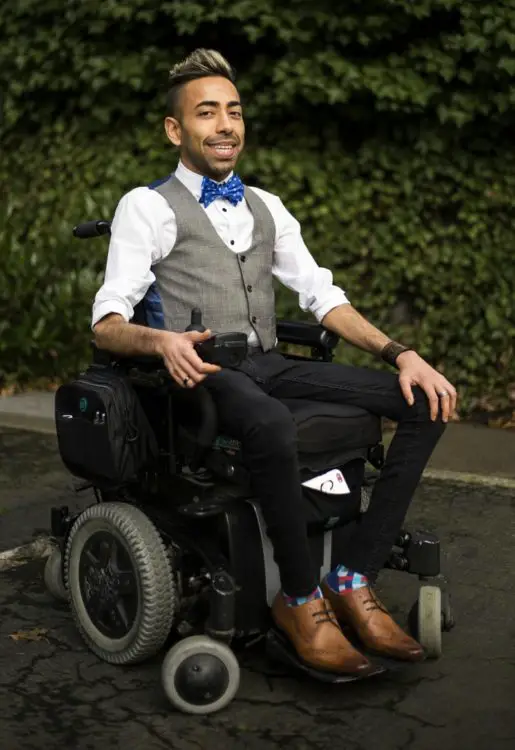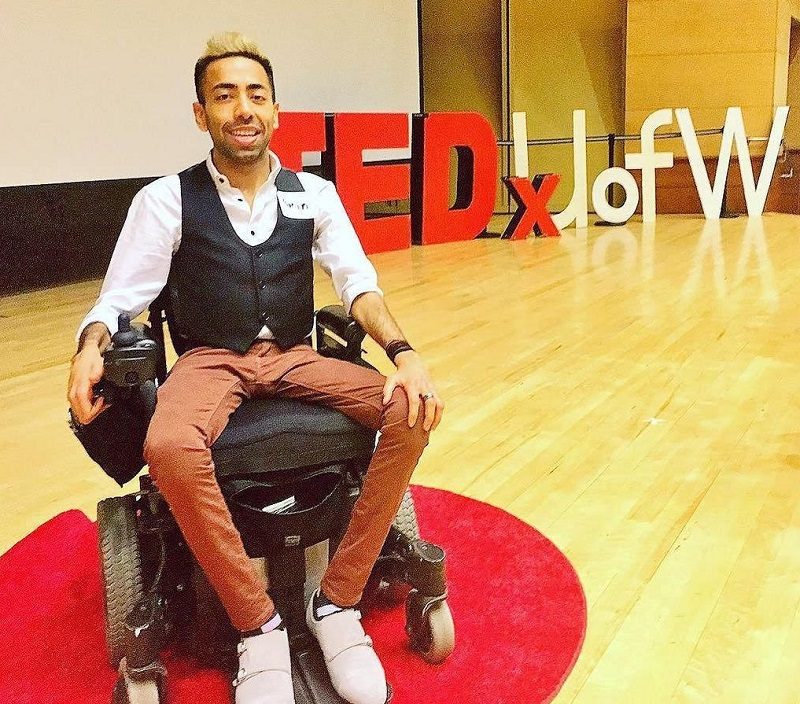
Dating Coach on Wheels: top tips from disability and dating expert
Do you suffer from low self-esteem and find dating too nerve-wracking a prospect? Well, then you’re in luck. Disability Horizons writer Carrie Aimes speaks to Amin Lakhani, the Dating Coach on Wheels. With hints, tips, and tailor-made, no-bullshit advice, he could be just the answer you’ve been searching for.
Amin, from Washington, has a progressive form of Muscular Dystrophy called Charcot Marie Tooth Syndrome. It presents itself as overall weakness, particularly the hands and legs. Now 29 years old, he has been a wheelchair user since the age of 15.
He excelled academically, achieving two Ivy League University degrees within four years, progressing onto a successful career at Microsoft. Nevertheless, the self-confessed “nerd with poor social skills” felt lonely and insecure, with only a few friends and no dating experience.
Finally, at the age of 23, Amin hired a dating coach, whom he worked with for around four years. This enabled him to totally transform himself, his relationships and his life.

He’s now popular, makes friends easily, has been on more than 40 first dates, enjoyed sex and fallen in love. Now the Dating Coach on Wheels, image consultant and motivational speaker is returning the favour…
You became a wheelchair-user at the tough age of 15. How did this affect your sense of self and your personal relationships?
I didn’t mind so much at first because I have a huge family and a lot of support. In fact, it was pretty cool because I had this brand new wheelchair and no longer felt exhausted all the time. Up until that point, I could walk a little, but I always used elevators and grabbed hold of the walls and furniture so that I didn’t fall, so the wheelchair gave me a lot more freedom.
But as soon as I started high school, that’s when I really noticed my disability – I felt different from all my peers. I didn’t know anyone else who used a wheelchair, so the fact that I stood out from the crowd made me really self-conscious. I was lonely, alienated and my relationships became strained because I wanted the impossible: I wanted to get rid of my wheelchair and be the same as everyone else. But of course, that could never happen.
I did have a few school friends but I never had a girlfriend, and was left out of all the usual teen dating etiquette. No girl ever wrote on my locker. I felt unattractive and thought I had nothing to offer a girl, so I shut myself down. If ever a member of my family asked why I wasn’t dating, I would use the excuse that I was too busy for all that.
Where did you get the idea to seek assistance from a dating coach, and why did you choose that route?
I had tried online dating – the likes of OK Cupid and Plenty of Fish. I was really thorough with my research and looked up what I should and shouldn’t be doing. I was enthusiastic and did everything right according to my research. I was, on paper, a catch. I was a grade-A student, a high-achiever academically and I had a great job at Microsoft.
But, despite all my efforts it just wasn’t working out for me and that made me feel hopeless. I think my downfall was the fact that I tried to hide my disability from my online dating profiles. I never showed pictures of my wheelchair and never mentioned it. I basically listed my achievements but failed to inject any personality or humour. Had I done this I think I would have been met with a more emotional response. Any response.
I look back now and cringe, but there’s nothing wrong with that. Ultimately, it led me to search online forums, which is where I found the guy who would become my dating coach. I was 23 at the time and he was doing a workshop called Conversation Secrets. It was then that I decided to get his advice.
You say a turning point for you was being told, by your dating coach, that you will never blend in but that’s okay. Instead, you should make yourself stand-out from the crowd.
Why did this realisation have such an impact on you, and why do you feel disabled people should aim to do the same?
Yeah, that really did make an impression on me. It’s true, disabled people are memorable because of their disability. It does make us stand out. But that isn’t a negative thing. Disabled people should embrace their individuality and dress to grab positive attention.
People are going to look at you anyway. By nature, humans are curious and we all check each other out – disabled or not. So, make people look at you and remember you for the right reasons. Make them remember your outfit or your style. If you put the effort into your self-image, you’ll look and feel good about yourself, and people won’t pity or feel sorry for you because they won’t be focused on your disability.
I also learnt, from my dating coach, that being in a wheelchair gives me free rein to talk to any girl in the world. No one is going to slap, punch or snub a guy in a wheelchair, right? So effectively, I could approach any girl I like and just start talking, because even if she’s with a guy, he’s unlikely to feel threatened by me. It’s all good practice.

You clearly pay a great deal of attention to your appearance – the signature bow tie, a pop of colour and an overall minimalist, classy look. How did you develop your personal sense of style and why do you feel this is so important?
I believe that you attract what you project. So, if you want to attract a punky type of person, it’s probably a good idea to shape your image around that look.
I now look completely different from how I used to. I changed how I dress and style myself according to the type of girls I’m attracted to. We all need to embrace our individuality, consider what we wear and how we wear it. If we don’t feel good about our own appearance, it affects our confidence.
Much emphasis is placed on sex, and for some disabled people, this can be a cause for concern. How would you coach someone whose disability prevents them from having sex?
Okay, first of all, sex isn’t everything, it’s just a small part of what a relationship is. It’s more important to talk, flirt, connect and feel comfortable in each others company.
With regards to sex itself, clients explain their difficulties, circumstances and challenges to me. But at the end of the day, it’s all about individuality. Every disability is different, therefore, it’s important to consider everyone’s specific situation.
So, there are two main things people should think about.
Firstly, I ask what the client wants. Do they want someone (a carer, for example) to support them to participate in sex? Or do they want their partner to support them in the act? Either way, it’s essential to do your research and maybe find out from others with the same physical limitations how they approach sex.
Secondly, you’ve got to make it sound fun and exciting for your partner. Tell them what you want in a flirtatious way and make it sound hot and kinky, rather than practical. Remember, you’re giving a gift to this person – to your partner. It’s a hugely intimate thing you’re asking and you’re entrusting your body to them.
You have talked candidly about sex and your own personal experiences. Why do you feel it is important to share this in order to help others?
I think it’s helpful for me to talk about my own experiences with my clients – it enables us to relate to each other. I’ve been through the same struggles myself and so I can identify with them in a way that an able-bodied dating coach couldn’t.
I offer advice that is sometimes unconventional. For example, I tell people it’s okay to feel like shit when you get rejected or things don’t go to plan. But you’ve then got to keep going, get out there and try again. All experience is beneficial.
It’s fair to say your target demographic is men. Why is this? Do you think men struggle more than women with confidence and making themselves attractive to others?
Obviously, as a guy myself, I can relate more to men, although I have had more female clients recently. I have a wealth of dating and relationship experience that allows me to relate and identify with male clients in particular.
There is definitely a gap of knowledge for some guys. They just don’t know how to get in the driver’s seat. Women want them to take control, but in order to get their guy to that place, they themselves have to take control. So a lot of the time I’m trying to help guys take charge.
Can you please explain your working methods to Disability Horizons readers?
As a dating coach, I help people build the confidence and skills they need to make themselves more attractive to others. It’s not just about sex and dating, but also forming meaningful relationships and friendships, too.
For the most part, I communicate with clients through video calls, but we also email in between. The length of time I spend with a client depends very much on what they want me to help with, and how hard they are willing to work to achieve their goal.
I spent up to a year working with one particular guy who is actually able-bodied. He was incredibly reserved in social settings, due to a lack of self-confidence, and was looking for more than just a few pointers.
What is the one question you are asked most frequently, and what advice do you give in response?
Men want to know how to ask a girl out and how they can tell if she likes them. I tell them there’s no way to really know for sure if a girl likes you back. You’ve just got to rip off the band-aid and ask them.
Women mostly ask how to find a guy who’s interested in more than just sex. My response is to learn to say no. Take your time and make a guy work for it. We love the chase and value what we’ve worked hard for. Don’t give it up on the first date as it leaves a bad impression. Inevitably, the guy would assume you give it up to all guys just as easily, and that’s ultimately not what men want.
What are your top dating tips for those who are particularly nervous or lacking in confidence?
1. It’s okay and totally natural to be nervous.
I still get nervous going on a date for the first time. It takes courage and courage leads to nervousness; everyone feels it. You’ve just got to do it. No matter what, you have to try. We all have to go through awkward stages and you will probably look back and cringe at yourself and your failed dates – I know I have. But again, that’s okay.
2. Bring up your disability early on, but in a humorous way.
Don’t try to hide it, but at the same time, don’t disclose everything in great detail. You don’t need to be 100% emotionally okay with your own disability. We’re all a little insecure about something. Just put your best foot/wheel forward so you can find the people who prioritise things other than their partner’s physical abilities. These people are a more rare breed, so it will take work (and inevitable heartbreak) to find them. But it can be done.
3. Pauses are a good thing.
In terms of date conversation, pauses, I think, are actually a good, powerful thing. They can be sexual and flirtatious, allowing you to lock eyes and check each other out. I am consciously quiet for extended periods when I go on a date.
During these pauses, I look my date up and down and make it known that I’m checking her out. This lets her know I like her and will probably make her giggle and flirt in return.
Remember not to talk too much and don’t attempt to fill the silences. It can be exhausting as it’s impossible to process all that verbal information quickly.
4. Do ask questions, but not just typical introductory questions.
Become interested in your date and respond to their answers. If they answer a question very briefly, realise that perhaps they don’t want to talk about that particular topic. Dig deeper into what they do want to talk about and tap into their interests.
Do you think there’s a limit to who you’re able to coach, and have you found any of your clients to be especially challenging?
Oh yeah absolutely. It’s all about motivation. If a client isn’t motivated or willing to do what it takes and work hard for it, they won’t get results. At the end of the day, they need to trust me and do what I tell them, no questions asked. I can’t do the hard work for them.
Where do you see your career taking you and what more do you hope to achieve?
I’m kind of happy where I am right now. I really just want to help more people.
I enjoy writing, but, mostly I love making videos, talking and being myself on camera. So, ideally, I’d like to be more active on YouTube. There’s something about being recorded that’s more effective than someone reading something I have written. In a video, you’re hearing my voice, seeing my mannerisms and humour. You’re receiving the information exactly how I want you to. You just don’t get that through writing.
I feel like I was born to do the work I do. All of my personal struggles have been for a reason. I now have a sense of purpose and can make an impact in a way that I couldn’t if I were able-bodied. In that way, my disability is beneficial.
You can find out more about Amin Lakhani, the Dating Coach on Wheels and get in contact with him on his website, Facebook, Twitter or Instagram. You can also visit Amin Lakhani’s YouTube channel.
By Carrie Aimes
Check out Carrie’s blog at www.lifeontheslowlane.co.uk and follow her on Twitter @claimesuk or on Facebook.
Get in touch with Disability Horizons by messaging us on Facebook, tweeting us @DHorizons, emailing us at editor@disabilityhorizons.com or leaving your comments below.
https://disabilityhorizonscom.onyx-sites.io/2017/01/disability-and-online-dating-should-you-tell-your-date-you-have-a-disability/
https://disabilityhorizonscom.onyx-sites.io/2016/06/disability-dating-sites-how-to-write-an-online-dating-profile/
Originally posted on 30/10/2017 @ 12:01 am
One Comment